It looks like you're using an Ad Blocker.
Please white-list or disable AboveTopSecret.com in your ad-blocking tool.
Thank you.
Some features of ATS will be disabled while you continue to use an ad-blocker.
share:
I just saw the news that Former YouTube CEO Susan Wojcicki is dead at age
56 and I seriously have to wonder if she was a victim of her own propaganda. Apparently she contracted some type of lung cancer around 2 years
ago and recently passed away. Am I the only one who has heard this same story an unusual number of times in the last few years? I have a family member
who passed away from cancer last year and my mother has a friend who passed away from brain cancer early this year. However, it's not just cancer, I'm
seeing many other illnesses become more common or aggressive and there seems to be a trend here.
In particular, there also seems to be a concerning rise in the number of heart attacks, strokes, clotting, etc. Not only have I seen many young and famous people dying from heart attacks and blood clots in recent times, I've seen it happening in my own community, I even knew a guy who was found dead sitting in front of his TV last year, only in his 50's. My father also worked with a guy who died from a heart attack just a few weeks ago. Well it turns out there is some evidence to indicate this isn't all just our imaginations.
A few days ago I was having a discussion about economics in another thread and the topic of Guatemala came up, I don't know much about the country so I visited the World Bank website to get some stats. While I was there I noticed a very interesting chart which showed the life expectancy at birth from the year 2000 up to 2023. For some reason the life expectancy had a large and sudden drop which began around 2021, indicating that something has seriously damaged their health in recent years. I suspected many other nations probably had a similar trend, and it turns out I was right:
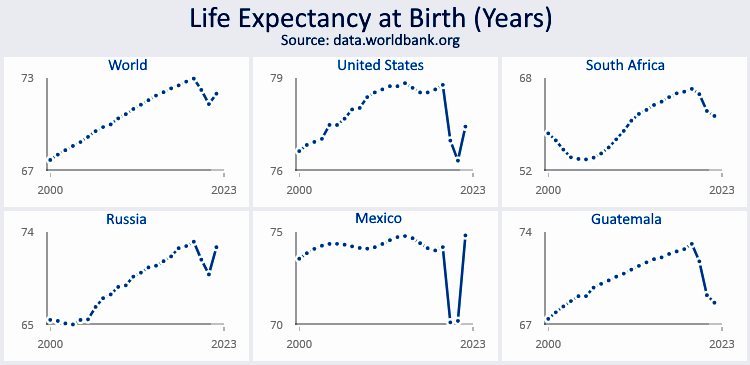
Not all nations have the down-trend, but it's still clearly visible even in the combined data for the entire world. To be honest I think some nations have manipulated their data to completely remove the trend, so I was surprised to see the United States appears to provide legitimate data. For decades everything was fine, technology was improving, health care was improving, the standard of living was improving... then the pandemic occurred and that trend was reversed. The only realistic explanation is that Covid-19 and/or the vaccine is responsible for this damage. I don't necessarily think it was one or the other, because they both contain the spike protein.
Something else I have noticed recently is a rise in dementia cases. Not long after my grandma got the Covid-19 vaccine I noticed she started to develop some memory issues and then I started to hear the same thing from other people. Just a few days ago I was watching the news and they were talking about how the number of dementia cases in Australia had doubled since 2018 and that really peaked my interest. I couldn't find any charts so I had to collect data from official government sources and create my own. I found data going back to 2015 but couldn't find data for every year, probably because we only get a good study or survey every few years.
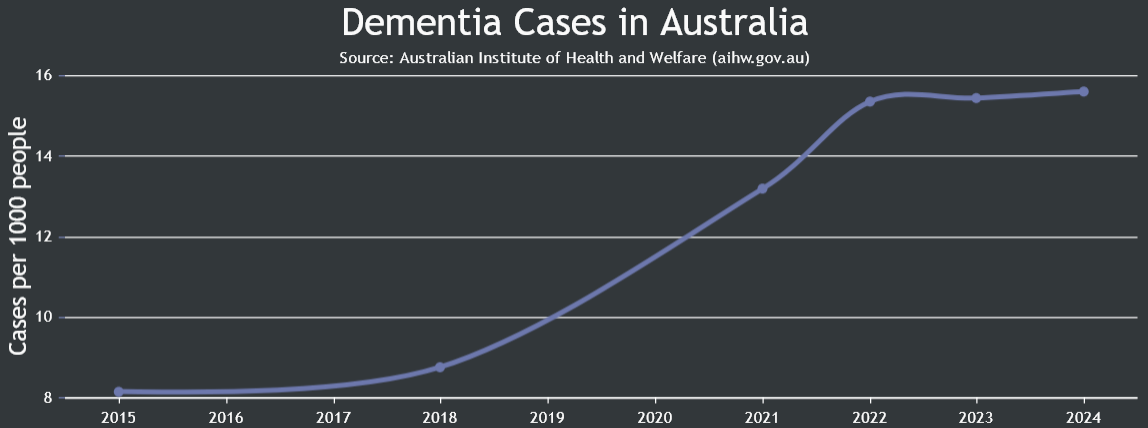
It would appear the rate of dementia cases has basically doubled since 2018, but I think this chart is somewhat misleading because we are conveniently missing data for the years 2019 and 2020. Each dot on the line represents a data point, the line is just a best fit for those points. We can make a more accurate estimation for the number of cases in 2020 by taking the rate of growth between 2015 and 2018, and extrapolating it up to 2020 right before the pandemic began. This is a reasonable thing to do since there were no major changes to our health or life expectancy before 2020. Doing so starts to reveal a trend which looks more sinister:
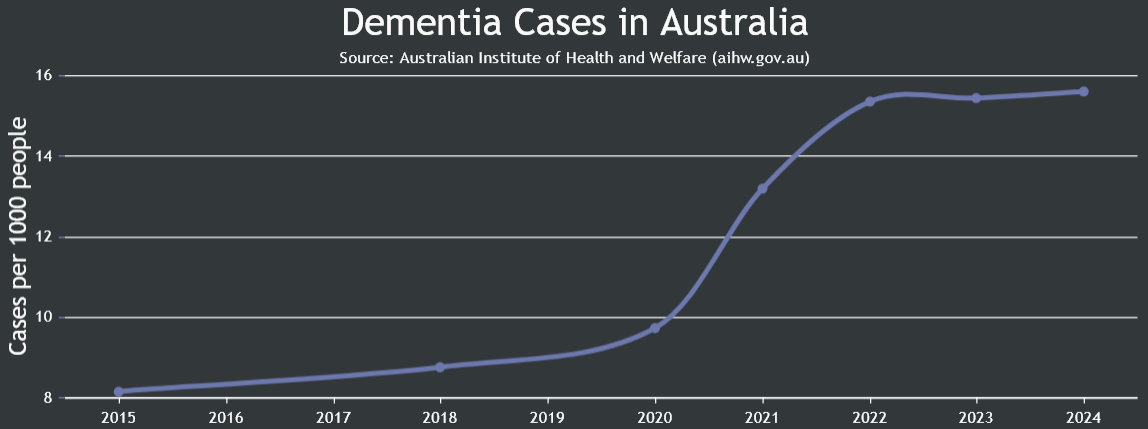
Between 2020 and 2022 there was an unprecedented rise in the number of dementia cases in Australia, then it seems to stabilize again, although case numbers remain high. We now know Covid-19 was leaked from a lab, the spike protein is probably genetically engineered, and the vaccine instructs our cells to produce that spike protein. It's a rapidly trailed vaccine, using highly experimental mRNA technology, for a novel lab created virus, but still they told children and pregnant women it was perfectly safe and effective, when in reality it was neither of those things. I don't think there's some grand depopulation plan, I think there's human ego and political dogma.
In particular, there also seems to be a concerning rise in the number of heart attacks, strokes, clotting, etc. Not only have I seen many young and famous people dying from heart attacks and blood clots in recent times, I've seen it happening in my own community, I even knew a guy who was found dead sitting in front of his TV last year, only in his 50's. My father also worked with a guy who died from a heart attack just a few weeks ago. Well it turns out there is some evidence to indicate this isn't all just our imaginations.
A few days ago I was having a discussion about economics in another thread and the topic of Guatemala came up, I don't know much about the country so I visited the World Bank website to get some stats. While I was there I noticed a very interesting chart which showed the life expectancy at birth from the year 2000 up to 2023. For some reason the life expectancy had a large and sudden drop which began around 2021, indicating that something has seriously damaged their health in recent years. I suspected many other nations probably had a similar trend, and it turns out I was right:

Not all nations have the down-trend, but it's still clearly visible even in the combined data for the entire world. To be honest I think some nations have manipulated their data to completely remove the trend, so I was surprised to see the United States appears to provide legitimate data. For decades everything was fine, technology was improving, health care was improving, the standard of living was improving... then the pandemic occurred and that trend was reversed. The only realistic explanation is that Covid-19 and/or the vaccine is responsible for this damage. I don't necessarily think it was one or the other, because they both contain the spike protein.
Something else I have noticed recently is a rise in dementia cases. Not long after my grandma got the Covid-19 vaccine I noticed she started to develop some memory issues and then I started to hear the same thing from other people. Just a few days ago I was watching the news and they were talking about how the number of dementia cases in Australia had doubled since 2018 and that really peaked my interest. I couldn't find any charts so I had to collect data from official government sources and create my own. I found data going back to 2015 but couldn't find data for every year, probably because we only get a good study or survey every few years.

It would appear the rate of dementia cases has basically doubled since 2018, but I think this chart is somewhat misleading because we are conveniently missing data for the years 2019 and 2020. Each dot on the line represents a data point, the line is just a best fit for those points. We can make a more accurate estimation for the number of cases in 2020 by taking the rate of growth between 2015 and 2018, and extrapolating it up to 2020 right before the pandemic began. This is a reasonable thing to do since there were no major changes to our health or life expectancy before 2020. Doing so starts to reveal a trend which looks more sinister:

Between 2020 and 2022 there was an unprecedented rise in the number of dementia cases in Australia, then it seems to stabilize again, although case numbers remain high. We now know Covid-19 was leaked from a lab, the spike protein is probably genetically engineered, and the vaccine instructs our cells to produce that spike protein. It's a rapidly trailed vaccine, using highly experimental mRNA technology, for a novel lab created virus, but still they told children and pregnant women it was perfectly safe and effective, when in reality it was neither of those things. I don't think there's some grand depopulation plan, I think there's human ego and political dogma.
edit on 11/8/2024 by ChaoticOrder because: (no reason
given)
a reply to: ChaoticOrder
it's called it called synthetic mRNA that doesn't communicate to your dna or have nano particles in it.
if you think that synthetic mRNA is not communicating to your dna by telling it what to do or that lipid nano particles are not a foreign substance that your body will fight against and might do strange sh@@.
I own a bridge in new york that is for sale and the potential for toll revenue is astronomical.
it's called it called synthetic mRNA that doesn't communicate to your dna or have nano particles in it.
if you think that synthetic mRNA is not communicating to your dna by telling it what to do or that lipid nano particles are not a foreign substance that your body will fight against and might do strange sh@@.
I own a bridge in new york that is for sale and the potential for toll revenue is astronomical.
edit on 11-8-2024 by LeviOtis because: (no reason given)
I know what your getting at I don’t wholly disagree.
But nothing will effect your health and life expectancy more then poverty.
I would be interested to see these charts compared to poverty levels in the respected areas.
The lockdowns plunged many into poverty.
I guess both poverty AND a bunk vaccine will kill you even quicker….
a reply to: ChaoticOrder
But nothing will effect your health and life expectancy more then poverty.
I would be interested to see these charts compared to poverty levels in the respected areas.
The lockdowns plunged many into poverty.
I guess both poverty AND a bunk vaccine will kill you even quicker….
a reply to: ChaoticOrder
edit on 11-8-2024 by Athetos because: (no reason given)
a reply to: ChaoticOrder
Every day I am happier and happier that I did not get those injections. I dont know if they're causing all these things but I think they are its too big of a coincidence.
Every day I am happier and happier that I did not get those injections. I dont know if they're causing all these things but I think they are its too big of a coincidence.
a reply to: ChaoticOrder
A wild and crazy thought just occurred to me.
What if Fauci, or some of his minions, went rogue, and decided to embark on their own form of population control?
Basis - Fauci was the one who, for years, was publicly announcing that the world was ripe for a pandemic like virus to strike and wipe out large segments of the population. Nobody listened to him. So, what if he decided to do it himself to prove he was right? Then, when it didn't take out enough people as originally thought, he conspired with pharma to develop some sort of a pseudo 'vaccine' to finish the job?
Just crazy musings at 6:30 in the morning, I'm sure...but what if?
A wild and crazy thought just occurred to me.
What if Fauci, or some of his minions, went rogue, and decided to embark on their own form of population control?
Basis - Fauci was the one who, for years, was publicly announcing that the world was ripe for a pandemic like virus to strike and wipe out large segments of the population. Nobody listened to him. So, what if he decided to do it himself to prove he was right? Then, when it didn't take out enough people as originally thought, he conspired with pharma to develop some sort of a pseudo 'vaccine' to finish the job?
Just crazy musings at 6:30 in the morning, I'm sure...but what if?
originally posted by: ChaoticOrderWhile I was there I noticed a very interesting chart which showed the life expectancy at birth from the year 2000 up to 2023. For some reason the life expectancy had a large and sudden drop which began around 2021, indicating that something has seriously damaged their health in recent years. I suspected many other nations probably had a similar trend, and it turns out I was right...
Can it be you're looking at Covid?
It definitely attacks arteries.
Or can it be you're looking at the effects of staying home, staying inside, and drinking?
Do you have a quarantined but not vaccinated population to compare against? One that isn't self-selecting?
a reply to: ChaoticOrder
A new study proves that erythritol causes blood clotting:
www.msn.com... p
Another tidbit of health information, a you tube doctor said the medical community really does not know how cholesterol is used by the body, the brain requires fat to function properly - the brain is 60% fat - then the doctor added that 99% of people should not be on anti-cholesterol medication.
Is it any wonder many people are experiencing ill health when we are given the wrong health advice.
Add to that the microplastics and who knows what else (?) that we all ingest and just thinking about it is mindblowing.
The study:
www.ahajournals.org...
A new study proves that erythritol causes blood clotting:
Consuming foods containing erythritol, a popular artificial sweetener that’s also used in keto diet products, increases the risk of heart attack and stroke, according to a new study.
www.msn.com... p
Another tidbit of health information, a you tube doctor said the medical community really does not know how cholesterol is used by the body, the brain requires fat to function properly - the brain is 60% fat - then the doctor added that 99% of people should not be on anti-cholesterol medication.
Is it any wonder many people are experiencing ill health when we are given the wrong health advice.
Add to that the microplastics and who knows what else (?) that we all ingest and just thinking about it is mindblowing.
The study:
www.ahajournals.org...
edit on q00000022831America/Chicago3737America/Chicago8 by quintessentone
because: (no reason given)
a reply to: Solvedit
Does it really matter? I mean, just think about it...the net result is the same.
If anything, I'd say the two scenarios are complimentary, wouldn't you?
Or can it be you're looking at the effects of staying home, staying inside, and drinking?
Does it really matter? I mean, just think about it...the net result is the same.
If anything, I'd say the two scenarios are complimentary, wouldn't you?
originally posted by: Flyingclaydisk
a reply to: Solvedit
Or can it be you're looking at the effects of staying home, staying inside, and drinking?
Does it really matter? I mean, just think about it...the net result is the same.
If anything, I'd say the two scenarios are complimentary, wouldn't you?
I was talking about the idea that the vaccine and not the virus causes the increase in mortality.
I was not talking about the idea that the pandemic was population control.
I don't know very much about Dr. Fauci but any doctor who knew epidemiology would realize pandemics have happened many times in the past and could happen again.
And yet another study:
www.bbc.com...
These studies are easy enough to find, if one bothers to search.
Brain fog after Covid linked to blood clots - study
www.bbc.com...
These studies are easy enough to find, if one bothers to search.
a reply to: quintessentoneThe clots could be the body's response to the arterial damage caused by Covid.
It was said many people had very mild cases of Covid and either didn't notice or had symptoms like a mild cold.
It was said many people had very mild cases of Covid and either didn't notice or had symptoms like a mild cold.
a reply to: Flyingclaydisk
just to add a bit of speculation to it, him and his boss smilin francis collins with a rich wannabe population controller ( see fact link below) named gates visting the NIH, doesn't look all that great either.

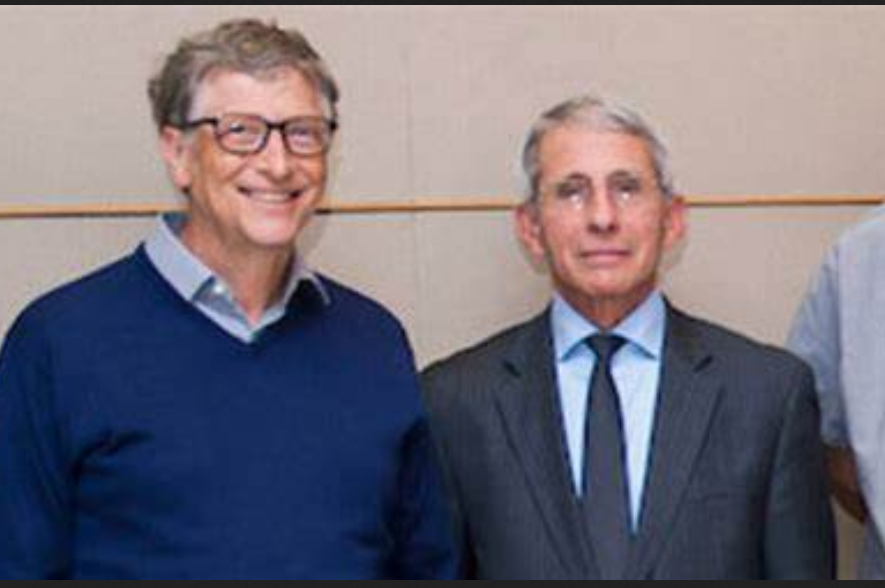


notice they say it's false. then when doctors started sending samples to labs for testing for the hormone, the who and catholic doctors said if they would have asked us we would have told them what labs to send it to. they claim the labs are ill equipped and that the methods used wouldn't give the right results. but their recommend labs could test it properly and the results would be accurate.
if that's not a load of BS i've never heard any before.
Nobody listened to him. So, what if he decided to do it himself to prove he was right? Then, when it didn't take out enough people as originally thought, he conspired with pharma to develop some sort of a pseudo 'vacci
just to add a bit of speculation to it, him and his boss smilin francis collins with a rich wannabe population controller ( see fact link below) named gates visting the NIH, doesn't look all that great either.




notice they say it's false. then when doctors started sending samples to labs for testing for the hormone, the who and catholic doctors said if they would have asked us we would have told them what labs to send it to. they claim the labs are ill equipped and that the methods used wouldn't give the right results. but their recommend labs could test it properly and the results would be accurate.
if that's not a load of BS i've never heard any before.
“Had we been informed from the very beginning, we would have advised them on alternative labs to take the tests to for accurate results and even interpreted the data correctly,” Lancet chief executive Dr Ahmed Kalebi said when the issue resurfaced in Kenya. In 2014 catholic bishops in Kenya raised fears about the vaccine but the WHO vouched for its safety.
25 years on, rumour by US anti-contraceptive organisation still damages tetanus vaccine programmes
edit on 11-8-2024 by BernnieJGato because: (no reason given)
originally posted by: Solvedit
a reply to: quintessentoneThe clots could be the body's response to the arterial damage caused by Covid.
It was said many people had very mild cases of Covid and either didn't notice or had symptoms like a mild cold.
"Could be" is speculation, I'll stick to reading empirical evidence in studies, which are easy to find.
Catching Covid may cause changes to the brain, a study suggests.
Scientists found significant differences in MRI (magnetic resonance imaging) scans before and after infection.
Even after a mild infection, the overall size of the brain had shrunk slightly, with less grey matter in the parts related to smell and memory.
The researchers do not know whether the changes are permanent but stressed the brain could heal.
The Post-hospitalisation Covid-19 study (PHosp-Covid), in Nature Medicine, blames higher levels of the protein fibrinogen and protein fragment D-dimer for brain fog.
Study author Dr Max Taquet, from Oxford, said: "Both fibrinogen and D-dimer are involved in blood clotting and so the results support the hypothesis that blood clots are a cause of post-Covid cognitive problems.
www.bbc.com...
Also, another one:
‘Westernization’, which incorporates industrial, cultural and dietary trends, has paralleled the rise of noncommunicable diseases across the globe. Today, the Western-style diet emerges as a key stimulus for gut microbial vulnerability, chronic inflammation and chronic diseases, affecting mainly the cardiovascular system, systemic metabolism and the gut.
We argue that healthcare professionals and societies must react today to the detrimental effects of the Western diet to bring about sustainable change and improved outcomes in the future.
www.nature.com...
edit on q00000056831America/Chicago5757America/Chicago8 by quintessentone because: (no
reason given)
I did some research on cancer stats in the US a few weeks ago and it's a little challenging to get real number data. Even though searches and
resulting titles were 2023 or 2024, all the data I came across IN THE ACTUAL DATA TABLES and written information were all only up to 2019, maybe even
a 2020 but I can't even find that. But everything I read was only 'projected' figures for recent years. And in fact, many of the sites noted that
2020 wasn't included because of 'Covid'.
And yes, I know it's early but I'm going to yell, THEY ARE HIDING DATA AND INFORMATION
This is one table that showed some numbers but I'm having a difficult time believing it.
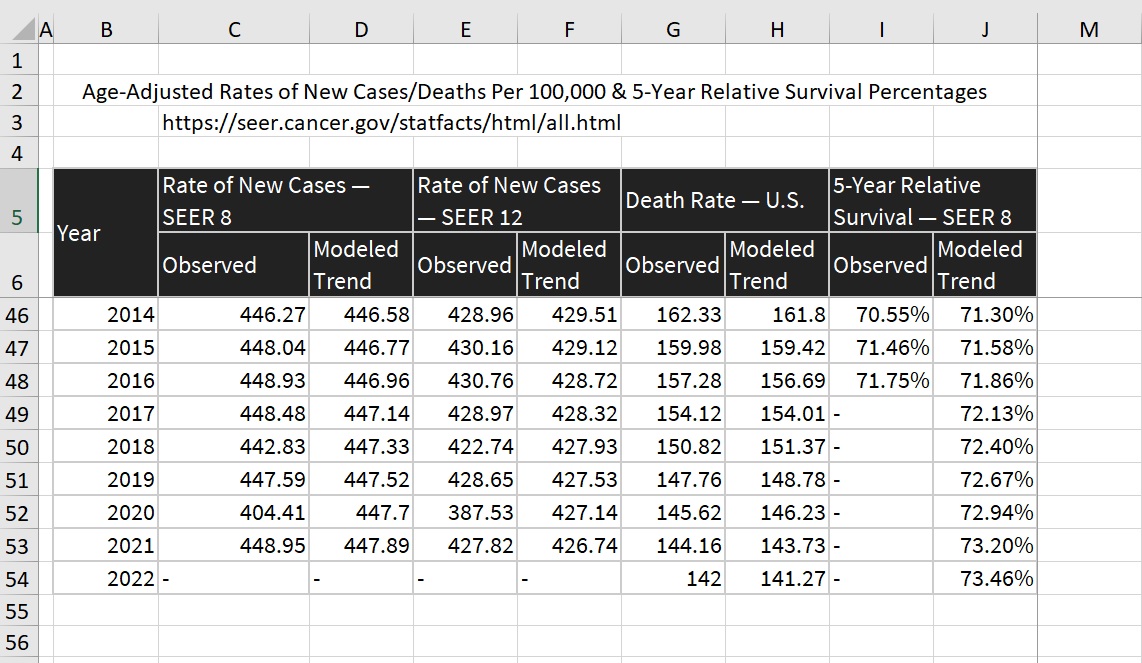
Not only the cancer rates crazy, but the relapse rate is even more severe. Almost everyone I know or heard of who was in relapse has died from their cancer in the last few years.
And yes, I know it's early but I'm going to yell, THEY ARE HIDING DATA AND INFORMATION
This is one table that showed some numbers but I'm having a difficult time believing it.

Not only the cancer rates crazy, but the relapse rate is even more severe. Almost everyone I know or heard of who was in relapse has died from their cancer in the last few years.
a reply to: StoutBroux
www.cbc.ca...
Indeed, over half linked to obesity and the foods we eat.
These 17 cancers are on the rise in younger generations
Some cancers increasing in millennials, Gen-Xers, U.S. study suggests, with over half linked to obesity
www.cbc.ca...
Indeed, over half linked to obesity and the foods we eat.
Even for those who are a healthy weight, the study found that diet may be associated with an increased risk of cancer.
The rise in digestive tract cancers, for instance, including those of the small intestine and other cancers not associated with obesity, could point to generational changes in the types of food people are eating.
"The way we live, the way we eat, the way we prepare our foods, the way we consume our foods, all of those things have a role," said Dr. Shady Ashamalla, a surgical oncologist at Sunnybrook Health Sciences Centre's Odette Cancer Centre in Toronto.
a reply to: ChaoticOrder
My area got hit hard with deaths after the roll out of the covid injections , So many people died that I knew that I have run out of fingers and toes to count them .
All were younger and fitter than me and I got so bad that I do not bother putting my suit for funerals away in the wardrobe it hangs on my bedroom door and will be used again on the 21st of this month .
Cancers have rocketed especially Turbo cancers which I have never heard of before this scam demic and heart attacks and strokes in the young people are not normal in the numbers I am encountering in my daily life .
2 brothers I was friendly with died of heart attacks within months of each other one was 41 and super fit ex military and always out running and looked after himself and their 18 year old cousin died of cancer in 2023 just to name a few .
All this was planned long ago
m.youtube.com...
jrnyquist.blog...
Worth a read that one ! .
The deaths are just starting and countries are now either stopping publishing the deaths or hiding the numbers and jailing whistle blowers like in NZ where the death rate was above 50 % at some sites .
When at the beginning of all this a Nobel prize winner and a Co discoverer of Aids was told to sit down and shut up he didn't know what he was talking about by some pleb after he published a paper on what he was observing under the microscope and the weird death of Dr Andreus Noack a professional in his field people really should have been paying better attention .
Already it is being noticed in maternity wards the number of spontaneous abortions happening and children being born with problems have sky rocketed all over , maybe in 5 or 10 years they will notice when their are hardly any Caucasian kids in the schools .
Funeral directors are saying they are sickened by the amount of deaths they are seeing ,especially in younger people and in summer time when they are at their quietest normally they are fully booked
rairfoundation.com...
My area got hit hard with deaths after the roll out of the covid injections , So many people died that I knew that I have run out of fingers and toes to count them .
All were younger and fitter than me and I got so bad that I do not bother putting my suit for funerals away in the wardrobe it hangs on my bedroom door and will be used again on the 21st of this month .
Cancers have rocketed especially Turbo cancers which I have never heard of before this scam demic and heart attacks and strokes in the young people are not normal in the numbers I am encountering in my daily life .
2 brothers I was friendly with died of heart attacks within months of each other one was 41 and super fit ex military and always out running and looked after himself and their 18 year old cousin died of cancer in 2023 just to name a few .
All this was planned long ago
m.youtube.com...
jrnyquist.blog...
Worth a read that one ! .
The deaths are just starting and countries are now either stopping publishing the deaths or hiding the numbers and jailing whistle blowers like in NZ where the death rate was above 50 % at some sites .
When at the beginning of all this a Nobel prize winner and a Co discoverer of Aids was told to sit down and shut up he didn't know what he was talking about by some pleb after he published a paper on what he was observing under the microscope and the weird death of Dr Andreus Noack a professional in his field people really should have been paying better attention .
Already it is being noticed in maternity wards the number of spontaneous abortions happening and children being born with problems have sky rocketed all over , maybe in 5 or 10 years they will notice when their are hardly any Caucasian kids in the schools .
Funeral directors are saying they are sickened by the amount of deaths they are seeing ,especially in younger people and in summer time when they are at their quietest normally they are fully booked
rairfoundation.com...
youtu.be...
I want to say one word to you. Just one word: Plastics!
It's plastics.
It's in 60% of all fish. It's in our penises and vaginas.
www.salon.com...#:~:text=On%20average%20there%20were%202.5,in%20the%20seafood%20we%20eat.&text=%22Th e%20presence%20of%20microplastics%20in,%2C%20and%20shrimp%2C%22%20Dr.
www.medicalnewstoday.com...enis-infertility-sperm-count-erectile-dysfunction#:~:text=The%20study%20revealed%20th at%20four,foreign%20particles%20in%20human%20organs.
hsc.unm.edu...
Prepare for the new paradigm, The Earth + plastic.
youtu.be...
I want to say one word to you. Just one word: Plastics!
It's plastics.
It's in 60% of all fish. It's in our penises and vaginas.
www.salon.com...#:~:text=On%20average%20there%20were%202.5,in%20the%20seafood%20we%20eat.&text=%22Th e%20presence%20of%20microplastics%20in,%2C%20and%20shrimp%2C%22%20Dr.
www.medicalnewstoday.com...enis-infertility-sperm-count-erectile-dysfunction#:~:text=The%20study%20revealed%20th at%20four,foreign%20particles%20in%20human%20organs.
hsc.unm.edu...
Prepare for the new paradigm, The Earth + plastic.
youtu.be...
edit on 11-8-2024 by TinfoilTophat because: Oh garbage dump my garbage dump
a reply to: TinfoilTophat
Yup, and the studies of just how our bodies are affected by plastics is still in it's infancy.
Yup, and the studies of just how our bodies are affected by plastics is still in it's infancy.
Dr. John Campbell is one that has been reporting on these issues for a while. This is his latest update, one of many.
There was a Senate inquiry into excess death here in Australia earlier this year. The Australian Bureau of Statistics did not do or did not want to share its homework on how the covid mRNA therapy factored into the rise. If it is anything like what Barry Young from New Zealand reported, there is a lot of political pressure to keep that one quite.
This has gone viral
I could see this train wreak coming once treatments like HCQ, Ivermectin and others got demonized. It was about the mRNA therapy all along. Not just code for spike protein in it. SV40 which suppresses the body to deal with cancer is just one of many other toxic codes found in the vials. The nano lipids also introduce a lot of other problems. Bill Gates has been aiming for a 10-15% reduction in population through vaccinations.
new topics
-
Just learned a really helpful trick for internet searches
Computer Help: 4 hours ago -
Not off to a good start
General Chit Chat: 5 hours ago
top topics
-
If they can see...they can read!!
Rant: 13 hours ago, 7 flags -
Not off to a good start
General Chit Chat: 5 hours ago, 4 flags -
Just learned a really helpful trick for internet searches
Computer Help: 4 hours ago, 3 flags
active topics
-
Not off to a good start
General Chit Chat • 11 • : charlest2 -
How we've changed in 100 years
Ancient & Lost Civilizations • 32 • : Xtrozero -
Simulation theory and have we reset before like a game?
Conspiracies in Religions • 40 • : G1111B1234 -
Tesla Cybertruck Explodes in Front of Trump Hotel in Las Vegas
Mainstream News • 78 • : cherokeetroy -
If they can see...they can read!!
Rant • 20 • : bluesman023 -
The C.D.C. Says There Was NO INFLUENZA Worth Reporting for the 2020-2021 Flu Season.
Diseases and Pandemics • 90 • : AlexandrosOMegas -
Maybe they didn't get away with it: The Lincoln-Kennedy assassination parallels. 7 sentences long.
History • 11 • : BernnieJGato -
Vehicle Strikes people in New Orleans
Mainstream News • 257 • : Xtrozero -
Post A Funny (T&C Friendly) Pic Part IV: The LOL awakens!
General Chit Chat • 7977 • : baddmove -
DONALD J. TRUMP - TIME's Most Extraordinary Person of the Year 2024.
Mainstream News • 44 • : marg6043
